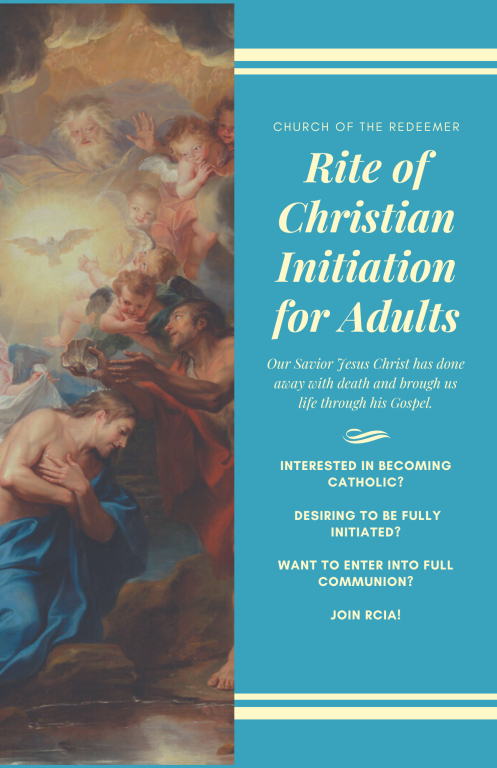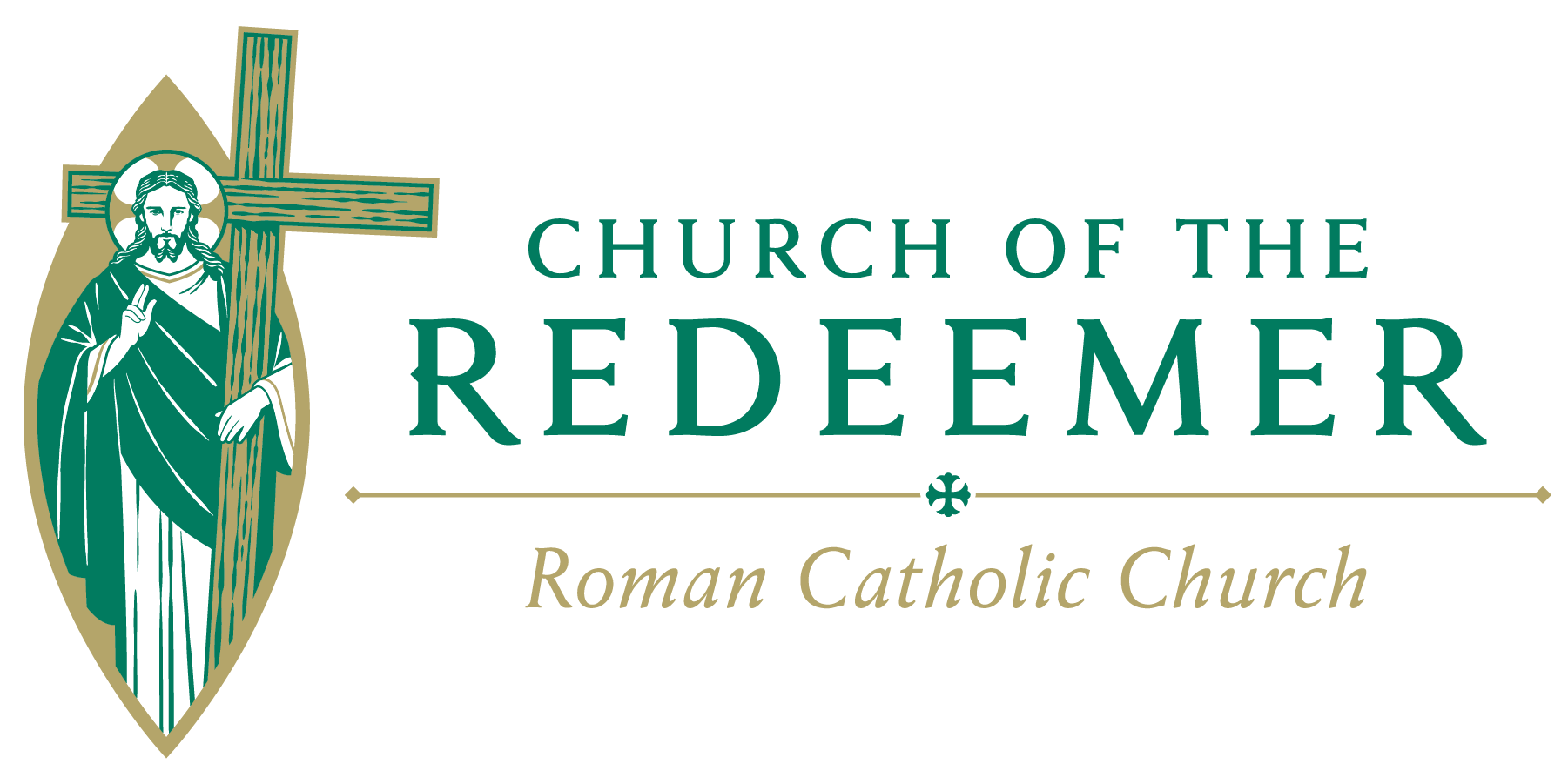How to become Catholic
We Welcome You to Join Us Through RCIA
Join the Catholic Church!
Rite of Christian Initiation for Adults is the process by which adults become Catholic.
The Catholic Church invites you to come and see!
Are you interested in learning more about the Catholic Church?
Are you unbaptized but recognize a need for spirituality in your life?
Are you baptized Catholic or Christian but never received any formal religious education?
Are you married to a Catholic and attend Mass but just don't know what the next step is to become one of the Catholic faithful?
Are you yearning for something more in your life?
Maybe you have been looking for enrichment in your life in all the wrong places.
Rite of Christian Initiation for Adults (RCIA) is the place for you. Every year adults are welcomed into the Catholic Community through RCIA. It is a learning and loving process in which conversion of the heart brings you to Jesus Christ who is our Lord and Savior. "Come to me, all you who are weary and find life burdensome, and I will refresh you. Take my yoke upon your shoulders and learn from me, for I am gentle and humble of heart. Your souls will find rest, for my yoke is easy and my burden light." Matthew 11:28-30. Please feel free to contact us for more information on becoming a Catholic.
The doors are open! We invite you to join us!
Contact: Alec McGuire, RCIA Coordinator

FAQ
-
How Does One Become Catholic?
Most members of the Roman Catholic Church are baptized as infants. They grow up in Catholic homes, receive form religious education and gradually come to share in the full sacramental life of the church.
Others -- those who were previously baptized in other Christian traditions -- become Catholics after making a solemn profession of faith, receiving communion and sharing Eucharist with the Catholic community.
And still others -- those who were not previously baptized -- become Catholic Christians through a process called Christian initiation (or catechumenate), which includes the sacraments of baptism, confirmation and Eucharist. For these people, the sacraments of initiation usually take place at Easter or at time that the readiness of these people is determined.
The Catholic church warmly welcomes new members and tries to provide an appropriate spiritual formation according to each person's need. Through the catechumentate, the church encourages an ongoing conversion to Jesus Christ and the reign of God he proclaimed. The catechumentate provides a structure for the proclamation of the gospel, catechesis (passing on the teaching of the church), public and private prayer, spiritual direction, the observance of the feasts, fasts, Sundays and seasons of the church calendar, direct contact with members of the parish community and participation in the work of the church for justice and peace.
The church wants to share its life with new members and offer them support and encouragement. The parish provides sponsors who can serve as spiritual companions for those who desire to become members of the Catholic church.
Through the various rites of the catechumenate, the church marks a person's journey to full membership. These rites reflect his or her spiritual growth and the community's loving concern.
-
How Does Christian Initiation Take Place?
Each parish is responsible for the formation of prospective members. This formation is guided by the needs of those who seek membership, the resources in the local community and the norms of the Catholic church. All parishes of a dioceses are united through the ministry of the bishop who, as chief pastor, is responsible for the initiation of new Catholic Christians. The bishop's role is clearly seen when he meets the catechumens for the rite of election (at the beginning of Lent). The liturgy, ordinarily celebrated in the cathedral church, beautifully demonstrates the diversity and unity of the church into which new members are initiated. This and other liturgies lead to the goal of Christian initiation: ongoing participation in the full eucharistic life and mission of the Church.
-
The Order of Christian Initiation
Period of Inquiry
This is a time of introduction to the gospel of Jesus Christ and of reflection on one's own life in the light of the values of the reign of God. It is an unstructured time of no fixed duration for questions and an opportunity for the beginnings of Christian faith.
Acceptance into the Order of Catechumens
Those who profess their faith in Jesus Christ and sincerely desire to enter the church celebrate with the worshiping assembly begin their journey of faith. They accept the way of Jesus, receive the sign of the cross of Christ and join in the liturgy of the word of God.
Period of the Catechumenate
Along with their sponsors for the journey, catechumens celebrate the liturgy of the word each Sunday, receive anointings, participate in prayers of faith and blessing and take part in the mission of the church to the world. During these months or years in the catechumentate, catechumens discover the love and power of God in their lives and in the church.
Election or Enrollment of Names
This is the liturgical rite, usually celebrated on the First Sunday of Lent in the cathedral of the dioceses, in which the bishop formally acknowledges the readiness of the catechumens and calls them to the sacraments of initiation. Catechumens -- the elect -- respond by expressing their desire for these sacraments.
Period of Purification and Enlightenment
Usually during the Lenten season preceding the celebration of initiation at the Easter Vigil, this is a time of intense immediate preparation. Centered on the word of God, creed, Lord's Prayer and evangelical scrutiny's, catechumens -- the elect -- experience the death and resurrection of Jesus Christ in their own lives.
Sacraments of Initiation
Catechumens -- the elect -- celebrate initiation in the threefold sacrament of baptism, confirmation and Eucharist ordinarily at the Easter Vigil. The waters of baptism put to death the old person of sin and give birth to the new person in Christ. Anointing with sacred chrism seals and strengthens the newly-baptized Christian. Faithful and active participation at the eucharistic table of the Lord as apostles and witnesses is the goal of Christian initiation and constitutes full membership in the church.
Period of Mystagogy
Mystagogy is the 50-day Eastertime following the celebration of Christian initiation. Newly-baptized persons receive sacramental catechesis and participate fully with the faithful in the eucharistic life and in the mission of the church for justice and peace. A program of Christian formation and incorporation into the full life of the Christian community assists the newly-baptized persons until their anniversary of initiation. This period reminds everyone that growth in faith is ongoing and lifelong.
-
Catechumen or Candidate?
Christian initiation, or catechumenate, is the way the church helps an unbaptized person prepare for and reflect on baptism, confirmation and Eucharist. A person in the catechumenate is called a catechumen.
However, when one speaks of a baptized person from a Protestant tradition, for example, who is preparing for reception into full communion in the Roman tradition, one is speaking of a different matter. A baptized person should not be led automatically through the full catechumenal process or be called a catechumen. Instead, we call him or her a candidate.
Frequently candidates for full communion in the Catholic church find certain elements of the catechumenate helpful in their preparation. For example, the focus on continuing conversion is appropriate for any Christian, especially at a time of transition. An understanding of Catholic beliefs, the practice of Catholic observances in the church year over an appropriate period of time and the experience of Catholic community are all necessary for an informed commitment that will last.
Since candidates are already baptized, the liturgical rites that mark the steps of the formation process are different from those of catechumens. There are rites of welcoming by the parish community and recognition by the bishop, a celebration of the call to continuing conversion and a penitential rite. Reception into full communion in the Catholic church takes place with the profession of faith, confirmation and Eucharist.
-
How Long Does It Take?
Christian initiation is not a program. It is the church's way of ministering sensitively to those who seek membership. For that reason, some people will need more time than others to prepare for the lifetime commitment that comes with membership in the Catholic church. The usual length of preparation if from one to two years. For those already baptized and who seek full communion in the Catholic church, the time may also vary. It seems reasonable that catechumens or candidates experience the yearly calendar of Catholic practices at least one time around before they are initiated. The process of spiritual renewal and catechesis should not be hasty, especially for those not accustomed to the feasts and seasons, rites and fasts the way Catholics observe them.
One of the better times for the sacraments of initiation is the Easter Vigil. It can also be a good time to celebrate the rite of reception into full communion with the Roman Catholic church. The celebration of the Easter Vigil dramatically points to the wellspring of the church's life: the death and resurrection of Jesus Christ.
-
What Is the First Step?
Anyone who is seriously thinking about becoming a Catholic Christian or would simply like more information can contact the nearest Catholic parish. Ordinarily, meeting with the pastor or a minister of the catechumenate would be first step in the journey toward becoming a Catholic. For Church of the Redeemer, contact Alec McGuire at amcguire@churchredeemer.org!
-
Common Terms
Apostolic Witness: How we live out what we believe
Candidate: A person baptized in another Christian faith tradition who seeks membership in the Church
Catechumen: An unbaptized person who seeks entrance into the Church
Catechumenate: The process of formation leading to entrance into the Catholic Church
Doctrine: What Catholics believe
Liturgy: How the community worships
Prayer: How we communicate with our God
Sacraments of Initiation: Baptism, Confirmation, and Eucharist
